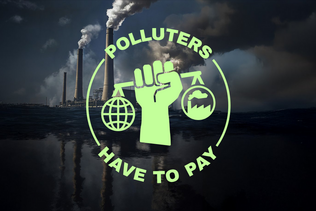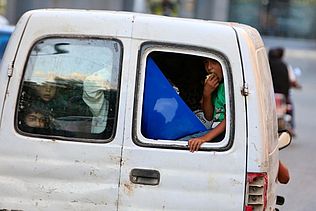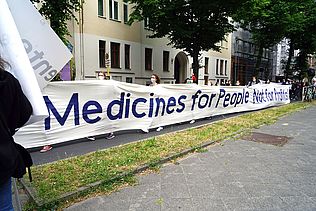Imagine you had fallen into a deep sleep just before the Covid-19 pandemic broke out and had only just woken up: a brief glance at the world situation and you would realise that something was going seriously wrong. The virus has poured gasoline onto the fire of an already broken system and amplified global inequality. It is also clear to see that the serious vaccine inequity is leading to deadly repercussions worldwide and jeopardising the containment of the virus and its mutations. Neither are “natural” consequences of the pandemic; they are the result of political action that gives primacy to capital interests and defending the balance of power over humankind’s fundamental health needs. To conceal this, in a never-ending stereotype, calls for solidarity are made by politicians, the World Bank, drugs companies and civil society who say that preventing pandemics requires global leadership for a worldwide health system that can rise to the challenges of this millennium. A joint declaration published in March 2021 by two dozen heads of state from Chile to South Africa to Germany states, “To make this commitment reality, we must be guided by solidarity, fairness, transparency, inclusiveness and equity.”
But one look at the global distribution of corona vaccines and you see that global health policy is neither equitable nor based on solidarity. Even though countries such as Brazil and Chile now have high vaccination rates, this does not change the global imbalance: Only 0.3 percent of the vaccine doses administered globally have been given in the 29 poorest countries.
Over 100 countries in the global South will have to wait for up to another two years to be supplied with vaccines to achieve herd immunity; years during which safety measures like lockdowns remain life-threatening because people without any social security to speak of immediately lose their income; years during which hundreds of thousands will die of Covid-19 in the face of inadequate public health systems; years during which poverty and hunger will increase as (informal) labour conditions become more precarious; so years during which the return to normalcy means nothing more than reinstituting the old conditions that were already sick even before Corona. The pandemic unforgivingly exposes the cracks and gaps in our global society.
Corporate interests cost lives
One of the greatest obstacles to the equitable supply of vaccines is the patent system. medico drew attention to this very fact early on with our international appeal “ Patents Kill”, demanding that medical knowledge and its final products be treated as the public property of humanity. “Patents Kill ” was initially meant as a warning, including against the backdrop of disastrous past experience: the handling of HIV/Aids in the 1980s. Back then, too, industrialised nations and the pharmaceutical industry claimed that strong patent protection was necessary to foster innovation. Once drugs finally became available, they remained unaffordable for the majority of the infected as the industrialised countries insisted on the patent system and the capitalisation of knowledge. For years, every cost reduction had to be painstakingly extracted from the industry in global struggles, which were also supported by medico. These were years during which millions of people died because they could not afford the costly medicines.
Now with Covid19 we are experiencing the health crisis of the century, and once again the industrialised countries are insisting on a system blocking the most effective ways out of the pandemic. Vaccines are not scarce because of a lack of manufacturing capacities. Patents prevent production from being expanded in many places around the world, from Dhaka to Cape Town. Germany, Europe and almost all industrialised nations along with them are ensuring through opaque contracts that the knowledge that was a prerequisite for the development of the Covid-19 vaccines is the property of the drugs companies, although the public purse has invested billions in the research and development of these vaccines. The industrialised nations have given the companies the contractual power to decide how, where and in what quantities the vaccines are manufactured and what they cost. This is state-sponsored expropriation by the private sector. The governments’ duty would have been to make the disclosure of research findings and fair distribution part of the funding agreements. They failed to do so.
So the industrialised nations have opted to defend the existing order down to the last dose of vaccine in defiance of people’s health needs and the epidemiological imperatives of containing the pandemic. They have done so by torpedoing the early joint request by over 100 countries of the global South to the World Trade Organization in light of the unprecedented global crisis to even temporarily suspend intellectual property rights for vaccine patents, known as the TRIPS waiver, negotiation round after negotiation round.
Surprisingly, the Biden administration recently came out in favour of at least a temporary suspension of patents for Covid-19 vaccines, further fuelling the current debate and increasing the pressure. However, the German government and also the EU Commission continue to categorically reject the release of patents, even though a majority of the EU Parliament recently came out in favour of the suspension. Whatever the final outcome, a life-saving commodity has been made artificially scarce to create high prices and perpetuate the system.
Covax initiative: How aid replaces human rights
Instead of implementing the TRIPS waiver, initiatives like “Covid-19 Vaccines Global Access”, Covax for short, were put in place. As a typical public-private partnership, it may be docked onto the World Health Organization and is supposed to enable equitable global distribution of vaccines. But it relies entirely on voluntary contributions from states, the pharmaceutical industry and philanthropic foundations. As such, it cannot resolve the contradiction between a monopolistic model and the very real need of disadvantaged countries to produce vaccines for themselves. These countries have no choice but to wait for voluntary deliveries. Worse still, Covax is being played by the European Union to ward off structural changes, citing the fear that the calls to suspend patents could anger the pharmaceutical industry to such an extent that it will pull out of Covax altogether. All the while, the industry’s share in this is a laughable single-digit one.
The Covax initiative is a prime example of how aid is replacing the right to the best possible access to health. In the face of structural inequality, it can be no more than a flimsy plaster that is designed to “systematically patch over the visible wounds of society” (T.W. Adorno). This is neoliberal solidarity in action, as presented in the declaration by more than 20 heads of state and government cited earlier. This also includes countries of the global South like South Africa and Costa Rica, which call for a transfer of technology and knowledge and the release of patents right after the outbreak of the pandemic in spring 2020 remains unanswered. It speaks volumes that the current declaration makes no mention whatsoever of patents and ownership. It reads like a declaration of surrender by the countries that dared to call the existing order into question. With Covax, however, the dominant states have founded a “company to mitigate global risks”, as medico partner Remco van de Pas aptly puts it, which has no legal or criminal enforcement power. It is a declaration of moral and democratic bankruptcy.
Has the moment come?
Organisations and alliances in many countries of the global South are resisting these dependencies and are dovetailing their struggles. An excellent example of this is the broad alliance of the C19 People’s Coalition in South Africa, which is combining its political action during the pandemic with demands for a basic income, public health reform and the reform of national legislation on intellectual property rights. With the slogan “black lives matter - vaccines for all”, they are demonstrating against rich countries blocking a patent waiver at the World Trade Organization (WTO) and in turn for global vaccine justice. It is the perfect moment for a broader global movement to fight for the right to the best possible access to health on an all-encompassing and universal basis, beyond pandemics, too. Now is the time to demand a policy that addresses the health needs of all people, that defends public health systems against capital interests and limits the power of the pharmaceutical industry. This is more cost-efficient than the system of patents. But above all, it is in the interest of all.





